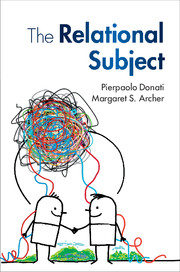Book contents
- Frontmatter
- Dedication
- Contents
- List of figures
- Acknowledgements
- Part I
- Part II
- Prologue: The sources of Relational Subjects and their resources
- 3 The Relational Subject and the person: self, agent, and actor
- 4 Socialization as Relational Reflexivity
- 5 Cultural reproaches to Relationist Sociology
- Part III
- Index
5 - Cultural reproaches to Relationist Sociology
from Part II
Published online by Cambridge University Press: 05 July 2015
- Frontmatter
- Dedication
- Contents
- List of figures
- Acknowledgements
- Part I
- Part II
- Prologue: The sources of Relational Subjects and their resources
- 3 The Relational Subject and the person: self, agent, and actor
- 4 Socialization as Relational Reflexivity
- 5 Cultural reproaches to Relationist Sociology
- Part III
- Index
Summary
Every theory about the social order necessarily has to incorporate SAC: Structure, Agency, and Culture. The problem in hand will govern which of the three is accorded most attention, so the acronym SAC is not a general rank ordering of priority between the three elements. This is a logical point; if something is deemed indispensable to something else, it makes no sense to ask if one element is more indispensable than the others. If all are necessary, then they have to be recognized as playing some role in every social theory. Indispensability means that social life comes in a SAC – always and everywhere.
Without being strict about definitions for a moment, leave out ‘Structure’ and the contexts people confront then become kaleidoscopically contingent; omit culture and no one has a repertoire of ideas for construing the situations in which they find themselves; without agency we lose activity-dependence as the efficient cause of there being any social order. In consequence, contingency or determinism would have a clear field – one cleared of social theorizing.
During the last quarter of a century, the ranks of SAC deniers have swollen dramatically. As Doug Porpora maintains, the meta-theoretical stance of denial rests upon conflation. Instead of distinctive properties and powers pertaining to Structure, Culture, and Agency, any pair is conflated with one another, thus ruling out examination of the (changing) interplay between them and its theorization. The guiding metaphor becomes that of ‘flows’ or ‘liquidity’ – and it depends upon a prior dissolution of all three components of SAC. Thus, today's leading trope of ‘liquid modernity’ explicitly depends on an eclectic combination of denials of ‘Structure’ (replaced, for example, by theoretical assertions about ‘destructuration’ in the work of Beck), denials of ‘Culture’ as anything more than what people carry in their heads (endorsed by Elder-Vass), and of ‘Agency’, rendered fluid by notions of serial self-reinvention, thus severing ties with personal and group ‘identities’, ‘interests’, and ‘commitments’.
- Type
- Chapter
- Information
- The Relational Subject , pp. 155 - 180Publisher: Cambridge University PressPrint publication year: 2015



